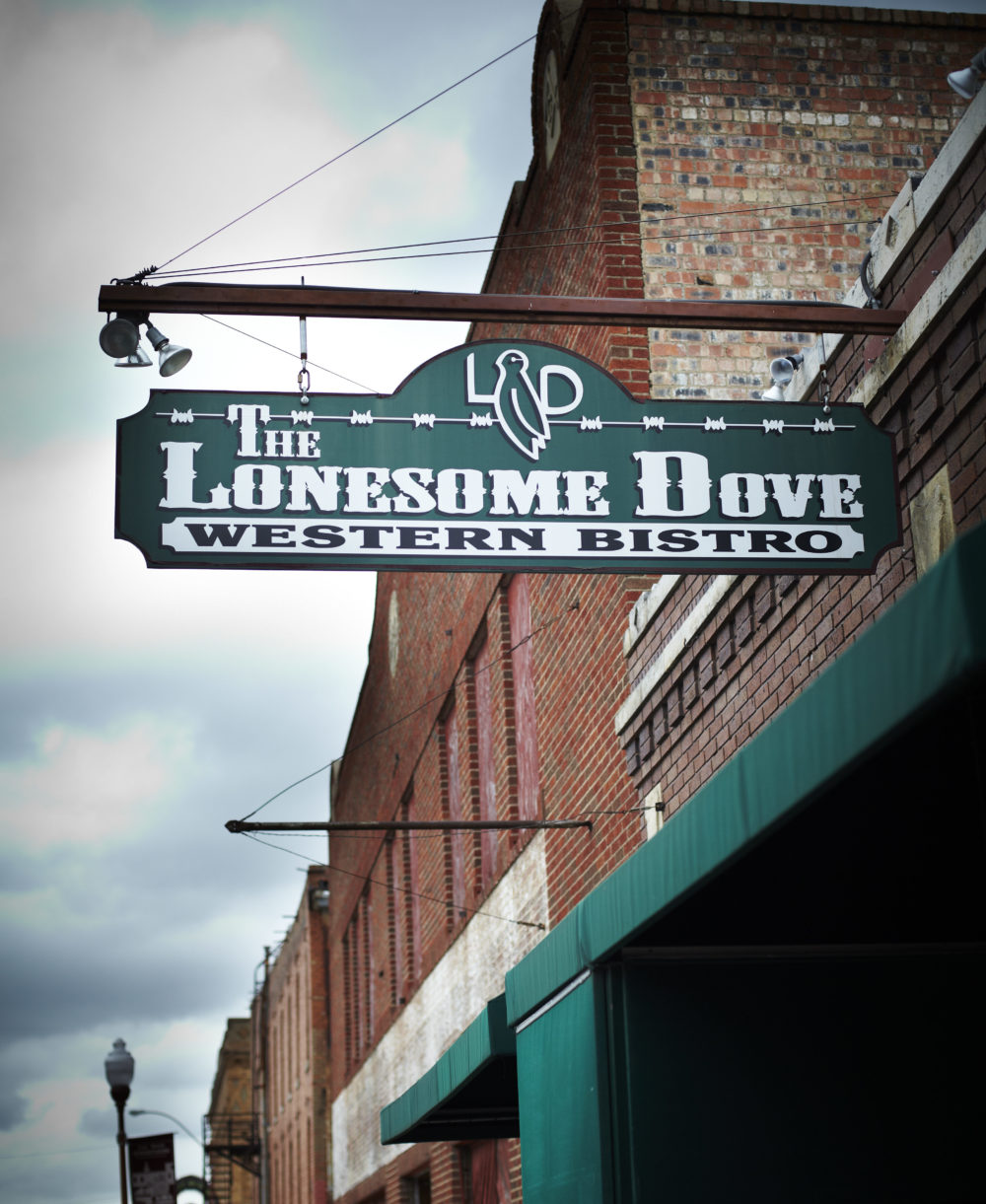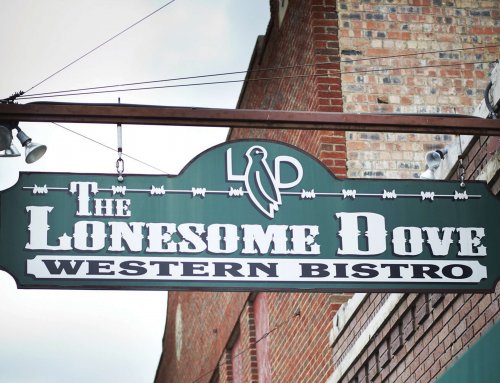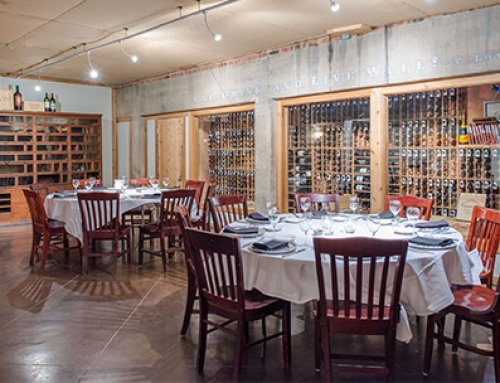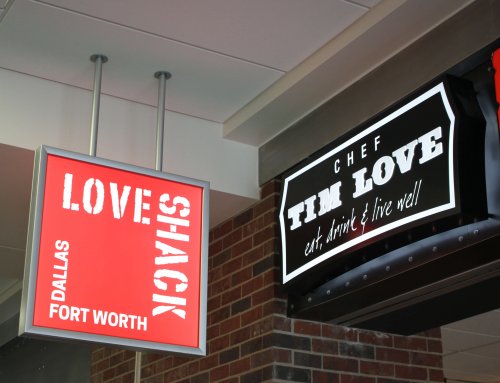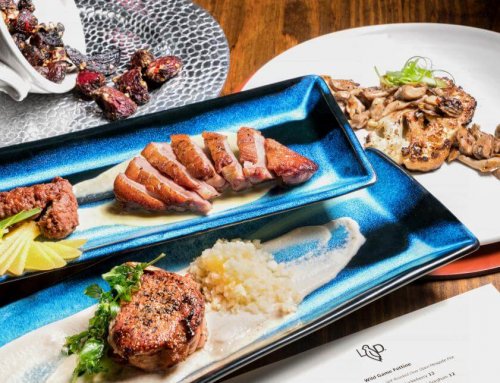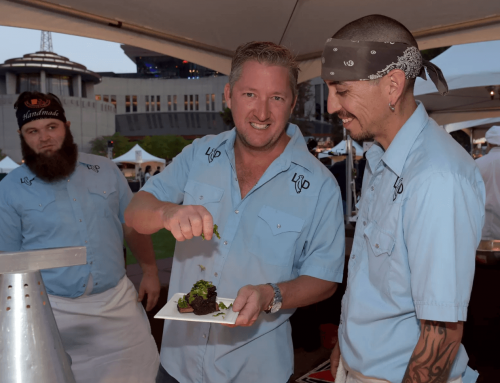Welcome to Lonesome Dove, a white-tablecloth restaurant in the Stockyards where chef/owner Tim Love and his wife, Emilie, serve up eclectic dishes with a Southwestern flair
Author: Patricia Rodriguez; Star-Telegram Staff Writer
Edition: FINAL
Section: FOOD
Page: 1
Elsewhere in the Stockyards on a Friday night, the main attractions are the rodeo, or a sale at one of the western-wear stores, or maybe the line dancers taking the floor at Billy Bob’s. But inside the Lonesome Dove Western Bistro, a newly opened white-tablecloth restaurant just a block south of Exchange Avenue, the star of the show is in the kitchen.
Wearing a dishwasher’s snap-front shirt, baggy chef pants and a cowboy hat, and working in an open space smaller than many home kitchens, owner-chef Tim Love is cooking up western-tinged dishes like grilled quail quesadillas, sweet lobster cakes with black-bean salsa, and red corn-crusted halibut for a full house of 50. Assisted by only a dishwasher and, on busy nights like this one, a line cook, he is everywhere – searing steaks, blackening fish, garnishing appetizers, dressing salads, plating desserts. He touches every plate that goes out.
This is exactly the kind of restaurant Tim Love and his wife, Emilie, wanted to open – a personal, friendly spot, with a decor that is cowboy-flavored yet sophisticated, serving up eclectic fare influenced by, but not limited to Southwestern cuisine.
But one has to ask – will white bean cassoulet with duck, lamb and quail, barbecue-duck spring rolls, and sesame-crusted king salmon play in the Stockyards, more often known as the destination for Tex-Mex and barbecue?
So far, the answer seems to be, boy howdy.
Open only since early June, Lonesome Dove has been packing them in, running a full house on most weekend nights. They’ve been busy enough that Emilie Love, who’d planned to keep her managing job at Del Frisco’s downtown, was able to quit there in mid-July to work at Lonesome Dove full time. And Southern Living has already dropped by, for a feature to run this fall.
The food, by and large, is excellent – hearty yet sophisticated, slightly reminiscent of Reata but more refined, as befitting a smaller, more intimate restaurant. That it is coming from a 28-year-old chef, a first-time restaurant owner who put together the deal in less than two months, is surprising only if you don’t know him, friends say.
“He’s a really talented guy, a really hard-working guy,” says Grady Spears, the star Reata chef who hired Love as a kitchen manager a couple years ago; Love worked there until leaving to begin work on the restaurant in April. “And the food’s good. Tim’s always been good with food.”
Um, well, not always. Growing up in Denton, where his mom lived, and spending summers at his dad’s farm in Cookville, Tenn., Love didn’t pay a lot of attention to food or cooking. Then, when he was 18 and needed a job to help pay his way through college, he applied for a position as a waiter at a popular Greek restaurant in Knoxville. They hired him to make salads instead.
This would have been OK, except the guy who was supposed to train him didn’t show up on Love’s first day and he was plunged into the dinner rush, not even knowing what was supposed to go on the Greek salads that a supervisor was screaming for him to make. Somehow, he figured out how to throw together the right combination of feta cheese, kalamata olives and tomatoes and made it through his shift. And he was hooked on cooking.
“I loved it,” he recalls. “I loved how it was either you act or you get buried. I loved the kitchen.”
Over the next few years, Love rose quickly, becoming a kitchen manager and sous-chef at various Knoxville restaurants even while carrying a full load of classes. By the time he had his degree in finance, he’d already been the chef for a Radisson hotel that then wanted to send him to the Culinary Institute of America for a year of intensified courses.
He went, but afterward, burned out from so many 80- and 100-hour weeks, he moved to Colorado and took a job cooking hamburgers and pizzas in a Breckenridge bar. For two years, he mostly snowboarded and skied, until he met Breckenridge restaurateur Wayne Spaulding playing foosball in a bar one night. Spaulding already owned one successful restaurant in town and wanted to open another; Love came on board as a cook and soon became the Uptown Bistro’s chef.
“That’s where I really got back into food,” Love says. Spaulding “let me do anything I wanted. We brought in truffles, we brought in fresh lobsters, we ordered John Dory. We wanted to be the premier place in town, and we got a lot of attention.”
There, Love also developed a few dishes that eventually would make it onto the Lonesome Dove’s menu, like the sesame-crusted king salmon, served here with jalapeno honey stir-fried vegetables, and the barbecue duck spring rolls, which he made with lobster in Colorado. And he began learning about wine, which would also help when he had to devise the bistro’s wine list.
By the spring of ’98, however, he and Emilie, who had begun dating after she began working as manager at the restaurant in Colorado, were ready to move. They came to Fort Worth to take jobs at Mira Vista Country Club. Eventually, he ended up at Reata, Emilie Love at Del Frisco’s. But Tim Love already wanted to own his own place.
“He was always looking at [restaurant sites],” Emilie Love recalls. “He’s the more adventuresome one. I was like, we have good jobs at the two premier restaurants in town. Why do we want to risk that?”
Then came the tornado that shut Reata down for more than six weeks. Tim Love had already spotted the empty space on North Main Street, formerly home to a western-wear store and a short-lived oyster bar. With Reata out of commission temporarily, they took it as a sign from God. On April 21, they signed a deal and set an opening date for June.
Doing much of the work themselves, they set about creating a restaurant nearly from scratch. It got crazy; they ordered their chairs off the Internet at 3 in the morning and sweated out whether they’d be delivered on time.
But the result is pleasing. The cozy interior, with its soaring copper-toned tin ceiling, is split by a long wooden rail, with a long wooden bar with high-backed Mexican iron barstools on one side and dining tables on the other. The three bold cowboy-inspired paintings were commissioned from a local artist; there are nice small touches, like tiny silver salt cellars from Mexico, set on each table.
Just as important was the menu; Tim Love wanted to serve dishes beyond the typical Southwestern pastiche, combining influences like the Asian, French, and German cuisines that also played a part in the West. That’s how he came up with such specialties as the duck spring rolls, served with sweet hoison and spicy garlic dipping sauces; seared sweet lobster cakes, topped with a dollop of cilantro-orange butter sauce; and a garlic-stuffed tenderloin, served over a hash of cabbage and potatoes and a side of asparagus, all the flavors carefully selected to mesh together.
“It’s a different kind of place for the Stockyards, but really it’s the same thing, just fancier,” says Stockyards entrepreneur Steve Murrin, who co-owns the building. “Everybody that I’ve taken there has felt it was just an absolutely unexpected bonus, so much better than they expected, just a top-quality place.”
The restaurant’s long-term success could still be considered a bit of a gamble, however, especially by those who remember the difficulties traditionally faced by unusual restaurants in that area.
“I would think it would be very difficult to have something other than barbecue, Tex-Mex or a steakhouse work down there,” says longtime local restaurateur Sally Bolick, who consulted on the short-lived Panther City Brewery, an upscale, Southwestern-flavored brewpub/restaurant that lasted about a year in the Stockyards in 1996-97.
Bolick, who is now co-owner of Just Catering in Fort Worth, says diners would come in before a concert at Billy Bob’s or after roaming the shops of the Stockyards and often seemed puzzled or turned off by the eclectic menu.
“Anything that was the least bit unfamiliar was really a tough sell down there,” she says.
But that was three years ago; Fort Worth’s restaurant scene has grown more diverse and sophisticated in even that short a time span. And Panther City was a big place, one that needed tourists and a steady weekday business to survive.
Lonesome Dove, on the other hand, seats only 52, plus another few dozen along the long, handsome bar. The Loves have made sure to cozy up to their new neighbors, offering $5 lunch specials for locals and buying supplies and decor items from nearby merchants. And, wisely, they close on Sundays and Mondays and serve dinner only Thursday-Saturday; this gives them open days to host lucrative private parties. They also provide valet parking, a service that allays the worst of a visit to theStockyards – finding a place to stable the car.
Eventually, the couple would like to open two to four additional restaurants. But they plan to always follow the same formula – serve good food, play good music, keep it small – and have fun.
“I love that I may work hard all day behind the scenes, but when it’s 5 o’clock, I’m just having a party and all these people are coming in and we get to serve them dinner,” Emilie Love says. “That’s really all it is, we’re just having a really big dinner party every night.”

